Given the omnipresence of smartphones in the lives of Chinese people, all multimedia content is now optimized for mobile. This is one of the factors that can first explain the growing success of podcasts. In 2018, the podcast market in China was considered to be worth 7 billion.
But between cultural podcasts, language courses, talk-shows, humor, and stories, which podcasts are the most successful in China? What are the secrets and trends behind this industry?
The podcast market in China is not like the West
Podcasts in China: a recent but promising market
A podcast (播客) is a downloadable audio program lasting between 5 minutes to 2 hours. Podcasts in China can be downloaded and listened to through Chinese podcast platforms . In general, podcasts are intended to inform, but there are also podcasts for pure entertainment, most podcasts are hosted by one or two people. Podcasting in China is a recent trend and is not yet mainstream.
Although the first real Chinese podcast seems to date back to 2005, it is estimated that it was around 2012 when the first online listening platforms were launched, that podcast began to be successful in China. An emergence which is roughly similar to that in the West.
The podcast market in China is still considered to be worth 7 billion in 2018, and its growth is impressive: it rose over 70% last year in terms of users to 170 million.
More generally, the market size of the Chinese audio market, including music and podcasts, is expected to reach RMB 6.09 billion by 2019, with 486 million users listening.
The distribution is equal according to gender (52% female), but podcasts listeners in China are rather urban, about half of them living in first or second-tier cities, according to industry analytics report from the second half of 2018.
Finally, concerning age, a podcast in China is a young trend: 80% of listeners are under 35.
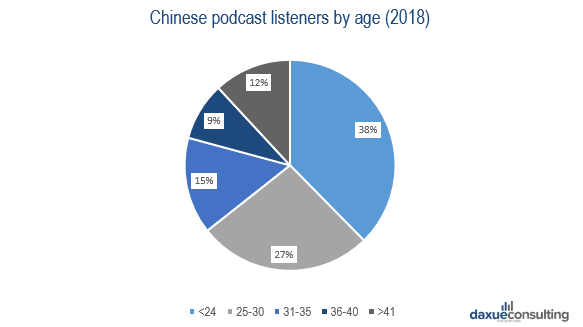
One of the biggest advantages of the podcast is its ease of listening. The main reason behind its success is the convenience of listening versus reading. Because people don’t have to carry any books or kindle with them, and they can listen while commuting.
In addition, in China, mobile phones are omnipresent, and wifi or mobile internet are available almost everywhere within cities. So you can listen while performing other task , and this use scenario must be studied to understand the listeners’ state of mind.
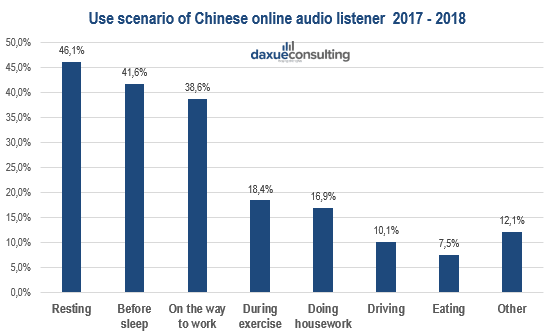
Based on Ximalaya’s statistics, Chinese people prefer to listen to podcasts while resting or before going to sleep. Nearly 38% of listeners e report listening to podcasts while commuting to work. This is not surprising considering the success of professional-content podcasts in China.
Educational podcasts in China are a major trend
Podcast stars in China are not singers, TV hosts or reality star: they are emeritus teachers or business people.
Whereas in the US, societal, personal journals, comedy and news related podcasts are very trendy, more and more educational podcasts are being created in China, on very different topics: history, literature, economics, parenthood, negotiation, communication, self-esteem, management…
On each topic, the most successful podcasts in China are often workshops or training sessions. For example, when typing parenthood or motherhood on Ximalaya, there are more than 10,000 search results, and the three most successful podcasts are online courses:
- Parenting Micro Classroom (31 883 000 listens)
- Parent-child education, educating children, how to be parents who teach? Learn how to better educate your children! (31 522 000 listens)
- What parents need to know (24 916 000 listens)
These educational podcasts can be interactive online Q&A’s with professionals and experts or live-streaming lectures where the audience can interact just like students attending a course.
One of the most popular educational podcast in China is a show by a former economics teacher called Xue Zhaofeng from Peking University. He has sold more than $8 million worth of podcasts on the Dedao audio platform and attracted 250,000 subscribers. Another very famous podcast called 好好说话, which is a training program on the art of conversation and communication succeeded in attracting thousands of subscribers paying 198RMB/year to access the content.

The Ximalaya platform has even launched an event called « 123 Knowledge Day » to promote this type of podcast in China. « 123 Knowledge Day » invites professionals and businessmen to share their knowledge and advice for one day, to access to this content Chinese podcast listeners have to pay. The last edition of this event, which also offered big discounts on all educational content, had a record turnover of 196 million RMB in one day.
A parallel market: the success of audiobooks in China
The Chinese audio market also includes audiobooks, which are not podcasts but constitute a significant part of the content listened to on podcast platforms in China.
According to iiMedia Research, the global leading new economic data mining and analysis organization, which released the 2018 China Audio Book Market Special Research Report, the online book market was estimated to be worth 4.5 Billion Yuan ( around 650 million USD) in 2018. Experts predict the market revenue to hit 7.8 billion yuan (US$1.15 billion) in 2020.
When we look at the distribution of content on Ximalaya, within the paid categories in 2018, 74% of the content listened to is audiobooks in China.
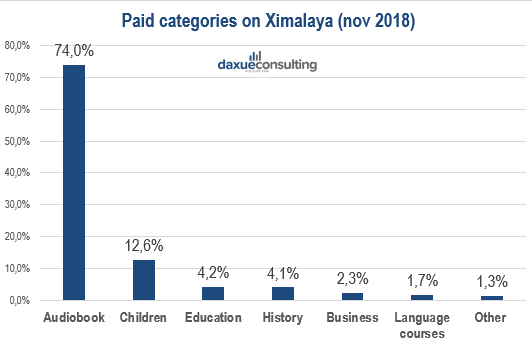
It is estimated that audiobooks account for more than 25% of China’s online audio content on all platforms combined.
The Chinese podcast platform Qingting even launched an audiobook event in Shanghai called « Tian Sheng » or « Natural Sound.» Its first edition attracted over 3,000 people.
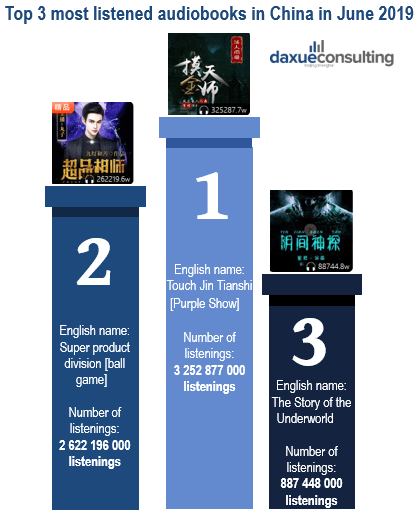
The success of audiobooks in China shows, first, a lack of time due to the increased pressure of the youngest Chinese, but also, an ever-increasing interest in reading and literature.
How can businesses generate revenue from podcasts in China?
It is estimated that 10,000 brands have worked with Ximalaya since the platform was launched. But how do you leverage podcast platforms in China?
First of all, it is important to know that the podcast market in China is divided into two main categories: professionals and amateurs. Most Chinese podcasters started without any experience or professional audio equipment. In China, podcasting is often seen as a hobby. So user-generated content is driving the podcast market in China, there are very few professional podcasters.
However, the rising podcast stars, who have become professional, are now multiplying the means to earn money. According to Fortune, professional podcasters in China can make up to $8 million every year for having 250,000 listeners. In comparison to America’s most popular podcast ever, Serial, which made only about $500,000 in the first year with more than 19 million downloads.
This reflects the growing potential in this market, where many brands now wanted to enter.
Advertise on podcast platforms in China
One of the easiest ways to generate revenue on podcast platforms in China is to place ads. Of course, prices vary according to the platforms, the duration of the ad and the channel on which you want your ad to appear.
Advertisements on podcasts are known to have a better memorization rate and drive more engagement. Voice is a good advertising channel because more intimate. In addition, podcast platforms in China are different from video sharing platforms because advertisements cannot be blocked. Even with an ad blocker, this will not block ads within podcasts. Finally, since listeners mostly listen to podcasts in doing other things, it makes inconvenient for them to manually skip the ads.
However, it should be noted that advertisements can be skipped on these platforms. To avoid being skipped, some key points must be respected:
- Choose a podcast related to your ad to make sure you get the attention of listeners
- Be creative: your ad must fit perfectly into the podcast (volume, voice, music…)
- Choose short, sharp times: find the right balance between too short and too long. On many podcast platforms in China, listeners can press a button to skip 15 seconds. Thus, an advertising spot of fewer than 15 seconds takes the risk of being easily skipped by clicking a button. It is possible to make spots up to 90 seconds on these platforms, but unless your advertising is very creative or very well targeted, it is better to prefer short times
Types of possible ads on podcast platforms in China:
- Pre-roll ads: 15- to 30-second ads placed at the beginning of the podcast. They are the most common forms of advertising on these platforms but are often perceived as real advertisements
- Mid-roll ads: ads that can last up to 90 seconds and are placed in the middle of a podcast. If they are well placed, they allow you to integrate very well into the podcast at a key moment
- Post-roll ads: the difficulty of these ads placed at the end of the podcast is that the entire podcast audience may not go until the last seconds of the listening. However, if you want to redirect the audience to a website or have a specific call to action, this can be very effective
- Live read ads: these are ads that are similar to product placement. It comes directly from the host and allows you to be seen as entertainment and not advertising. However, this requires a collaborative process, and the price is higher
Leverage KOLs
Podcast platforms in China are also full of KOLs! These podcast hosts have become stars with a strong influence. Thus, collaborating with them for product placement or live read ad can be very effective.
The Chinese umbrella brand Jiaoxia and its collaboration with the host Caicai has become a case study. In 2015, the brand called on the lifestyle blogger Caicai to promote its umbrellas. Caicai’s podcast already had more than 750,000 subscribers. The host then created an episode dedicated to the beauty of the skin and protection from the sun’s UV rays where she talks about the brand she discovered.
In 24 hours, the episode was listened to by a million listeners on Ximalaya. Thanks to this collaboration with a call to action and a promotion set up by the brand (each Caicai follower received a gift for every purchase), the brand sold 20,000 sun umbrellas in the first 24 hours. Within the first few minutes after the episode was released, 2,000 sun umbrellas had already been sold.
The podcasts KOLs, therefore, have a real power of influence and develop multi-channel communication. This is the case of the famous comedian, actor and podcast host Guo Degang (郭德纲先生), host of the show Guo Degang’s 21-year comic dialogue.
With more than 709,961 million listens on Ximalaya and always placed in the homepage suggestions, Guo Degang has developed a real strategy of influence.

He is multi-platform, publishing its free content on Bilibili and Youku as well. On Weibo, he also has 70.32 million fans:
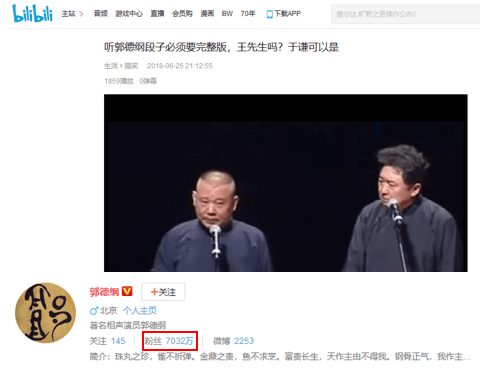
To identify which KOLs could be the best for your strategy, you can use consulting agencies services that will target your needs in the Chinese market.
Develop paid podcasts in China
The most lucrative solution is to develop paid content on these platforms.
What we call the ‘‘Pay for knowledge industry’’ in China includes podcasts with subscription fees, interactive Q&A’s online with experts or celebrities and live-streaming lecture-sessions where the audience can participate.
While in the United States podcasts are most often free (with an Apple subscription), some of the most successful podcasts in China are not free.
Most of the revenue in China’s pay-for-knowledge industry come from paid podcasts (not advertisements), according to China’s State Administration of Press, Publication, Radio, Film, and Television.
According to a study, two-thirds of users would pay 11 to 20 yuan every month for podcasts.
More generally, China’s paid digital content market is expected to grow from RMB 4.9 billion in 2017 to RMB 23.5 billion RMB in 2020.
This success can be explained by two things: first, Chinese podcasts listeners believe that paid content is of better quality and delivers more professional, more training content. The idea of paying for training is, therefore, easily acceptable. The second reason is definitely the ease of paying on a mobile phone for Chinese people.
Thus, investing in a podcast where part of the content is paid can be a very lucrative strategy in the long term. Usually, podcast hosts publish about 50% free content, and 50% paid content. However, today, the vast majority of content on Ximalaya is free. Of 100 million recordings, around 300,000 require payment to access. It is up to you to find the right balance and above all to judge if your content is worth paying for.
Promote your own service
Finally, your podcast can be directly linked to the service you offer and become a real living advertisement for your business. To do this, you will have to offer a real show because the risk is that the feeling of advertisement is too strong.
Keep up to date with industry trends and deliver quality and most importantly, new original content. Use podcasts to answer your customers’ most frequently asked questions.
The strength of podcasting is that it creates a direct link between the host and the potential customer who is listening to it. Especially if there’s video. The host thus builds trust with its auditors and creates proximity. Moreover, podcasting is the right complement to a blog.
Finally, remember that podcasting in your marketing strategy is not about going viral. The objective is to reach a very specific audience.
This is what Daxue Consulting is setting up with its China Marketing Podcast, China Paradigm, which interviews entrepreneurs in China to discover the secrets and behind-the-scenes of the business environment in China.
You can listen to the episodes of China Paradigm here.

The best podcast platforms in China in 2019
The main particularity of the Chinese podcast market is that it is platform-centric. It means that, first, platforms decide which podcast is trendy, and second decide on business models and all other formalities. From a business point of view, it means that if you want to reach Chinese podcasts listeners, you can’t miss these platforms!
Ximalaya is today the biggest podcast platform in China.
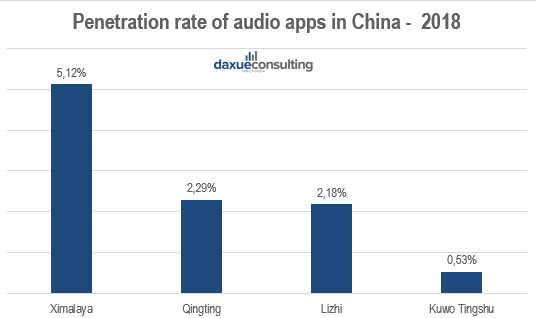
Ximalaya 喜马拉雅
Launched in 2013, Ximalaya is the most popular platform for podcasting and audiobooks in China. More than 5 million people are regularly posting podcasts and audio content on the platform. Ximalaya has both professional and user-generated content, but the most successful podcasts come from professionals.
The app self-reports that its app has been downloaded more than 540 million times. In terms of active users, it is around 40 million. More than 5 million people are posting content, and it is estimated that 10,000 new audio contributions are posted on the platform every day.
In terms of the target audience, 47% of Ximalaya users are female, 53% male. Around 39% of Ximalaya’s users are under the age of 24. In terms of occupation, 19.5% are students, and another 21% are white-collar workers.
The platform is particularly successful when it comes to audiobooks: it has the authorization of 70% of China’s audiobook copyright holders.

Ximalya has today enormous potential and has done several rounds of funding before finding a stable business model. In 2017, the platform announced having brought in revenues 100 million, coming mostly from selling paid content, not ads.
In addition, the platform has developed its strategy and now collaborates with car brands to launch car entertainment systems for car passengers. The brand also works together with home appliance brands in the development of intelligent household appliances such as the Xiaoya smart speaker launched in 2017.
De dao 得到
Unlike Ximalaya, which covers a broad range of content, Dedao is more focused on professional content.

Launched in November 2015 with over 100 million USD in funding, De dao has expanded very fast. The app provides paying users with a library of popular books and podcasts with transcripts.
De dao does a lot to create a community of professionals and students or any other person who wants to learn. With social features, the community feeling is strong. Users share their opinions and criticisms on economics, history, and other topics.
In targeting a specific audience, De Dao is becoming an educational platform to democratize knowledge for everyone in China.
Lizhi 荔枝
Launched in 2013, Lizhi targets mainly very young viewers, under the age of 24. It has been known thanks to its brand signature ‘Everybody can be a podcaster.’
Lizhi mostly focuses on individuals’ podcasts, compared to Ximalaya and Dedao, which also offer radio stations’ broadcasts and very professional content.
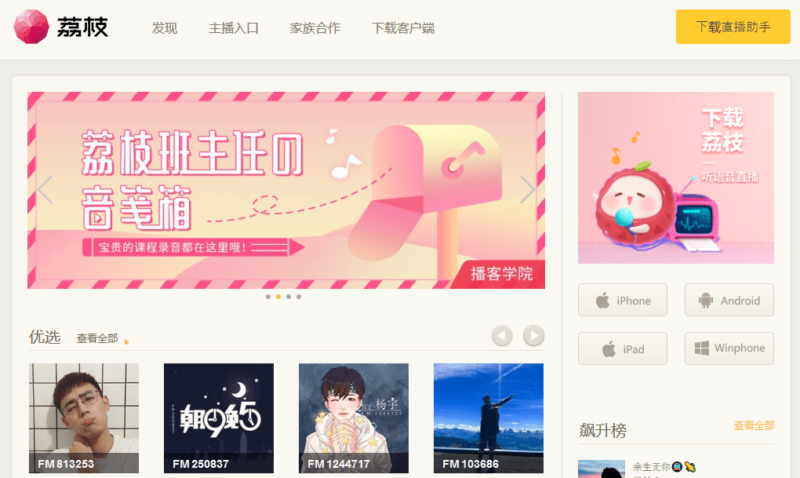
The content is, therefore, lifestyle, young and funny. Various channels are available like Music, News, Poetry, Talk Shows, Foreign Languages, etc. This platform can be recommended to any brand targeting students or young people. 70-90% of the users are female. Among all the users, 50% are students.
For a foreign company, it’s easy to register, with a Chinese phone number. It’s also free. But one thing must be highlighted: on Lizhi, it is impossible to upload previously recorded files. All the content you want to publish must be recorded using the app.
Qingting 蜻蜓FM
Founded in 2011, Qingting FM is the platform that offers the most diversified and international content. Apart from podcasts, the platform is also known to broadcast international radio stations (more than 3,000). Thus, whether it is the user generated content or the professionally generated content, most podcasters develop their radio channel.
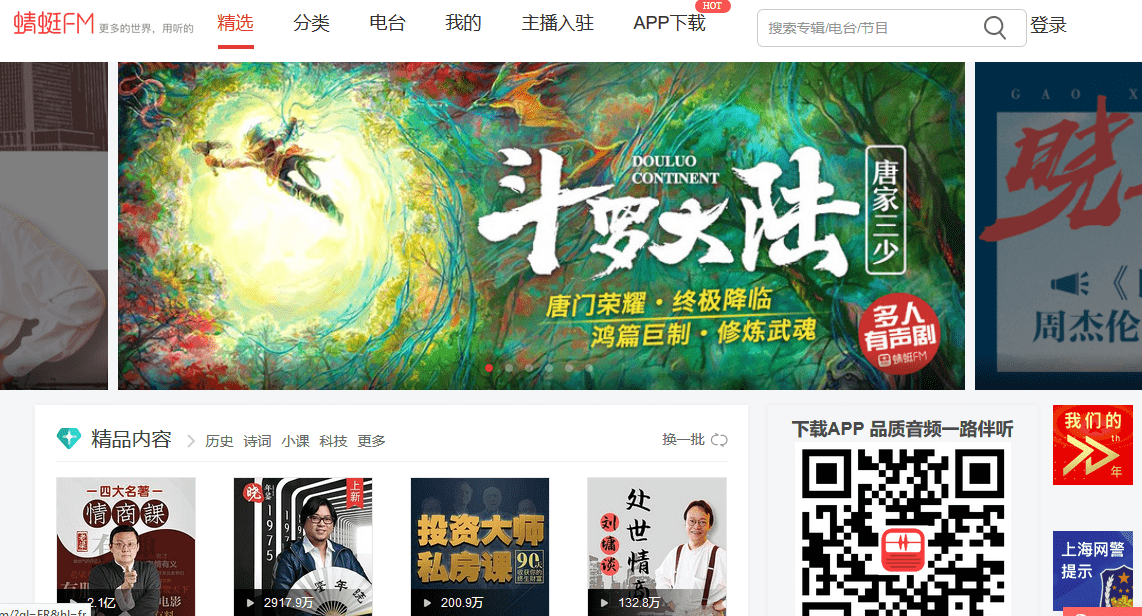
Today Qingting.fm has about 300 million users from around the world, with 12 million of them active daily. It is estimated that Chinese podcast listeners spend around 120 minutes per day on Lizhi. Just like Ximalaya, Qingting.fm has launched several premium radio programs that millions of users pay to subscribe to.
Qingting has developed a “professional user-generated content” strategy, to recruit and train podcasters to produce high-quality materials. It is a response to Ximalaya’s growing competitiveness. Qingting has already signed with more than 12,000 content creators from whom they hope to generate high incomes.
Finally, whatever platform you choose, keep in mind that the content you post on it must comply with the same SEO rules as any other content posted on the internet. To optimize podcast traffic generation: apply yourself to write the bio, write an introduction in English in Chinese, and opt for cross-channel communication, Wechat, Weibo, Douyin…
Top podcast channels in China in 2019
To understand what kind of podcasts your target audience is listening to, Daxue Consulting developed a ranking of the most popular podcasts in China in mid-2019.
Based on Ximalaya statistics, here are the 15 most listened to podcast channels until June 2019 (all free):
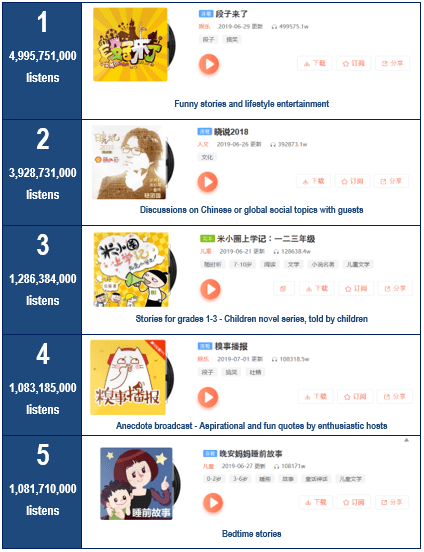
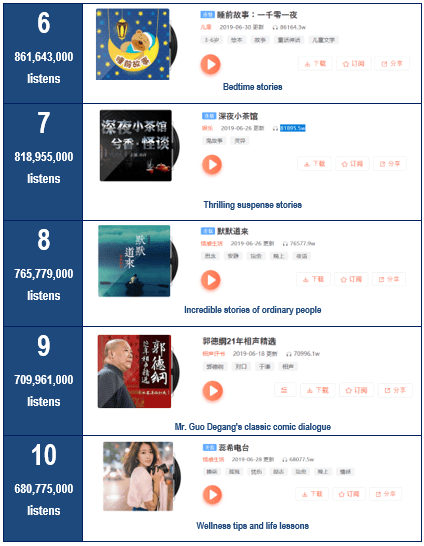
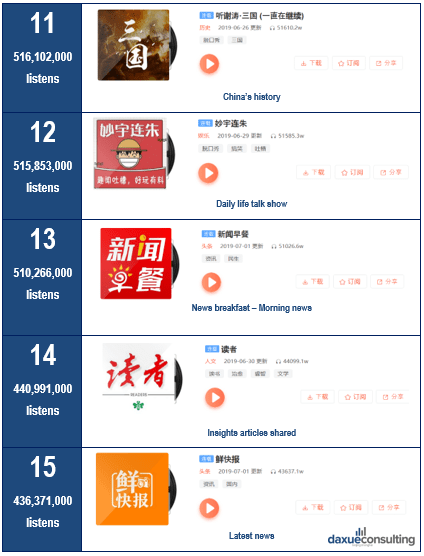
What does this ranking of Chinese preferences reveal from a cultural point of view?
By analyzing the ranks, two major observations can be made:
- Tales, fables and stories are of major importance in Chinese culture
In China, the transmission of knowledge from parents to children often involves reading more or less traditional stories and myths. In this top 15, 3 places are taken by children’s stories channels. Thus China remains a culture of oral transmission and fables.
It also depicts a social reality: much of the content is intended for children, which means that they are subject to screens from an early age. Actually, according to the 2018 Children and Youth Services Review, the time Chinese children spent in front of the screens is directly related to the habits of parents, especially mothers. Also, it may mean that parents prefer to share educational content with their children when they are with them and leave the entertainment content for when the children are on their own.
Additionally, if we compare the ranking with the ranking of Apple’s Podcast application, we see that there are no stories for children that are ranked high. This means that the podcast industry in China has succeeded in reaching families.
- Motivation, hard-work, and determination are key values for Chinese Millennials
As this ranking shows, Chinese people like aspirational content. 3 places in this top 15 are occupied by materials with aspirational tips and quotes. The stories of ambitious, self-made men and women who have shown their power and achieved their goals are viral. This reflects a society where the younger generations are still driven by this strong value: hardworking. Especially to achieve a better standard of living. This can be illustrated by the online debate at the beginning of 2019 with the ‘996’ lifestyle (9 am to 9 pm, six-day-a-week work schedule) which is very trendy among ambitious Chinese Millennials.
Thus, analyzing Chinese trends and preferences in terms of online content is an excellent way to get culturally or economically relevant insights. If you want to analyze the online preferences of your target audience on any topic, you can contact us directly at dx@daxueconsulting.com to get in touch with our consultants.
Author: Steffi Noël
Make the new economic China Paradigm positive leverage for your business
Do not hesitate to reach out to our project managers at dx@daxueconsulting.com to get all answers to your questions





